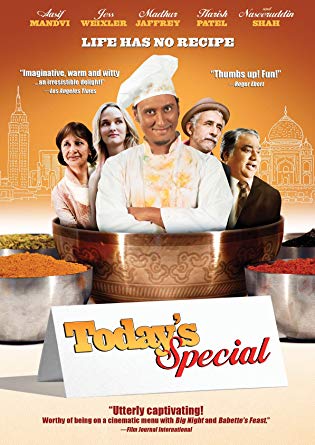Buckle up we’re getting straight into it.
Spoilers ahead.
Trust me, this is not the kind of movie where spoilers matter.
Today’s Special tells the story of a young ambitious chef whose family require him to divert his path away from his career as a French chef in a fancy restaurant to at least temporarily take over for his family business, which he hates because it’s how he grew up, and then a magical marginalised man shows him how to do an excellent job at the thing he’s doing, he meets a girl, there’s some low-stakes dealing about whether or not he stays or goes, about whether or not he and the girl can work out despite challenges in her life, and in the end his magical marginalised person leaves and he has to make do on his own, eventually choosing to stick with the new direction in his life of continuing the family legacy and letting the whole French Chef thing go away.
This movie is pretty stunningly basic, and it’s good but it’s also really unremarkable and the thing about it that makes it remarkable is remarkable.
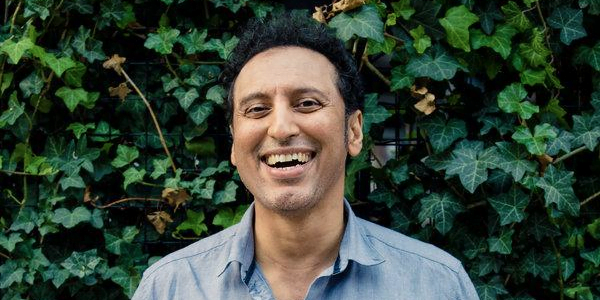
There’s a problem talking about this movie, though, and it’s because of Aasif Mandvi.
This guy is Aasif Mandvi. That’s not his full name, which is Aasif Hakim Mandviwala, but he goes by Aasif Mandvi and I mean no disrespect by using that version. You may know him as a character you forgot about in Avatar: The Last Airbender or a Daily Show correspondent from a million years ago, back when the worst thing in the world was the Bush administration. You maybe even know him from Halal in the Family, which I’ve not seen.
I have an utterly inexplicable, pointless joy at seeing Aasif Mandvi. I actually considered not talking about this movie in smooch month, because really all it would be is me trying to justify liking this very standard and unremarkable movie because every time in a movie Aasif Mandvi shows up, I tend to get happier. Even in Avatar! I’m often left thinking oh hey, I’m glad he’s getting work. It’s so strange an attachment!
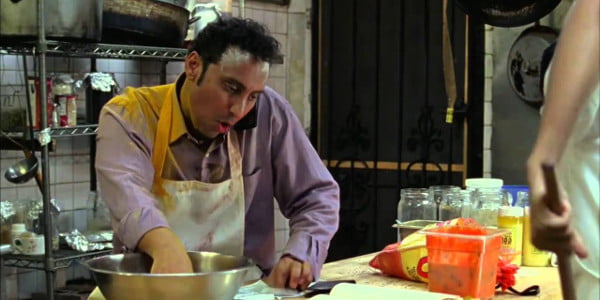
I hesitated as well about making this a Smooch Month movie, because the romance is definitely one of the plots on the trot – there’s absolutely a major plot about Aasif’s character working in his father’s restaurant, dealing with his mother and his father. This plot is mostly about Aasif reconnecting to his family (and perhaps his own culture). It could be seen as dealing with internalised racism, too – Aasif resents his family’s Indian-ness and runs away to join a French Restaurant.
Aasif is definitely the main character of this smooch movie, and again, he’s – well, he’s Aasif Mandvi. I think if I liked the actor less I’d be more annoyed by this, because the bulk of this movie is prioritising his development and his connection to his family and his romantic interest, rather than on the relationship that he’s developing.
The movie also has a Magical Marginalised Person, a Mr Miyagi or Bagger Vance or whatever you want to compare him to.
And this is where the wheels kinda judder on how by the numbers this story is. Because this guy isn’t a Magical Other, wandering into the life of a gormless white person who needs a lesson. This guy, Akbar, is absolutely a go-with-your-gut, be-part-of-your-culture, live-in-your-own-life experience-as-teacher Indian chef and Taxi driver character who would be a walking stereotype, and he absolutely is a device more than he is a character, but in this movie, he’s talking to a guy like him. He’s talking to another Indian guy.
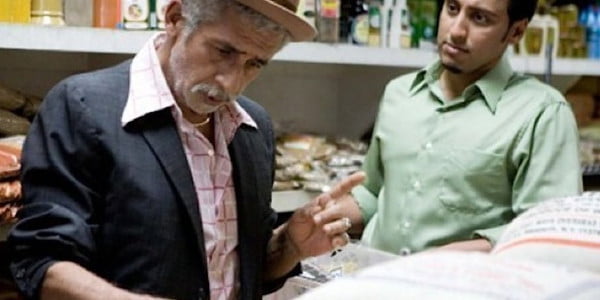
That is, Akbar is talking not to Aasif as the bringer of other wisdom, waiting for it to be immortalised and perfected in the story of a mediocre white guy, it’s an elder Indian man talking to a younger Indian man about keeping your connection to a culture even in the face of a life that wants to drive you away from it. Which, you know what, that’s actually pretty heavy! This story includes the older Akbar talking about British Occupation over a lovely Indian meal, and like – that’s not the kind of thing I expected in a movie with such low stakes!
And that’s another thing about this movie – the stakes are really low but it’s all with this subtle air that this instant in Aasif’s character’s life is going to be really different, and the path he winds up taking is good, even if the alternative paths are just as good, but different. It’s really interesting because it feels like almost every major problem in the movie could be resolved by apologising over a meal, if things went wrong.
I think that’s what’s so remarkable about it.
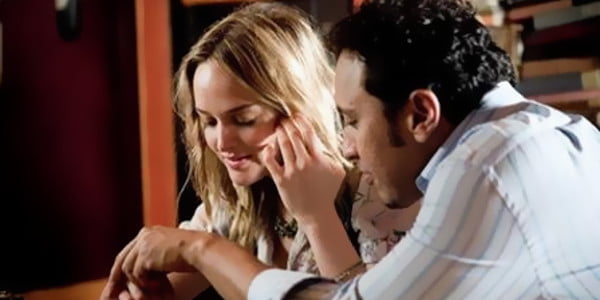
There are lots of movies about food, about chefs. Chefs are great for script writers, because script writers love to venerate people who make extremely temporal artistic experiences. The writer and chef connect to one another in the writer’s vision, because chefs are driven and exceptional and aggressive and weird and they work behind the scenes and they’re underappreciated and it’s so hard to be a writer, Dad, you don’t know what it’s like to need to be constantly creative. What’s more, movies about chefs get you all sorts of wonderful visuals in the making and preparing of foods, they montage well, they look great in final display, and you don’t need any fancy special effects for the payoff, you can just show actors liking what they’re eating.
It’s because of that, that Just Another Chef movie should be really boring and familiar. And Today’s Special doesn’t do anything with the structure of its plot or its dialogue or its jokes to really be different. All it does is tell you the story so old and worn it has holes in it… and just lets the actors and the culture recontextualise it.
It’s a good, lovely, low-stakes movie. I watched it when I was feeling really vulnerable and stressed. I kept wondering if I’d have to fastforward through a plot beat, figuring it might go for a Liar Revealed twist or an agonising experience of his father dying and… nah.
Nah.
None of that happens.
Today’s Special is a lovely smooch movie, and my biggest wish is that it could do more with the smooching, make Carrie more prominent and give her more time. But then it’s not like this movie needed more of its focus to be on a white person discovering Indian culture when it was already doing a lot with an Indian person discovering it.
